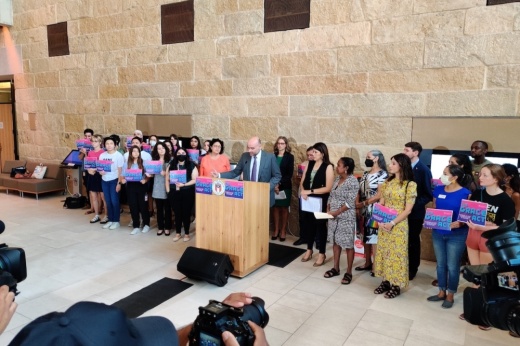A proposal to effectively decriminalize seeking or providing abortion services locally was first forwarded by District 4 Council Member Chito Vela after this spring's leak of the U.S. Supreme Court's intention to overrule its landmark Roe v. Wade decision. Vela's measure, the GRACE Act, places abortion-related investigations at the bottom of the priority list for any use of city resources including enforcement.
The resolution also blocks city resources from being used on surveillance, data collection, and information sharing or storage related to abortions and other reproductive health care.
“It’s an unfortunate series of events that has brought us here. But we know what the criminalization of abortion will do: It will drive it underground. It will not reduce the number of abortions; it will just endanger women, their health," Vela said. "I do not want someone who tries to perform their own abortion or goes to an amateur provider for an abortion to fear seeking health treatment after something goes wrong. That’s what we’re trying to do. We’re trying to make sure that more people don’t get hurt, don’t get injured and that they do not delay health care.”
Ahead of their July 21 vote on the Vela-sponsored resolution, council members took time to express their support for the city's push against Texas' abortion bans. Mayor Steve Adler said he believed officials needed to act to protect a constitutional right to health care after the Supreme Court "got this wrong."
“I never thought we would need the GRACE Act. Even as bad as it has gotten over the years and trampling on the right to make these decisions by individuals, I never thought it would get this bad," District 5 Council Member Ann Kitchen said.
Several members also said, while the state established an abortion ban, a high need for additional reproductive and maternal health care funding, foster care system improvements and other family support remains in Texas. Referencing how state residents are affected by issues ranging from maternal mortality and homelessness to the state power grid and gun violence, District 1 Council Member Natasha Harper-Madison said "it’s hard to call Texas a pro-life state with any degree of seriousness.”
After their vote, officials were also joined by Austin-area state lawmakers who said they plan to combat new laws and file bills promoting abortion rights during the 2023 legislative session.
In addition to the GRACE Act, council also voted to update city code by adding reproductive health decisions to anti-discrimination rules related to housing and employment. That action was proposed by a resolution from District 2 Council Member Vanessa Fuentes, which passed through council in May.
Finally, one of two Adler-sponsored items will cement coverage of "long-term birth control" such as vasectomies through city health insurance and potentially roll out a broader public education program about such care. Adler's second resolution requests city management to evaluate whether Austin can offer benefits to provide its employees access to abortions outside of Texas.
All four items passed in 10-0 votes with District 6 Council Member Mackenzie Kelly not present for the meeting.





